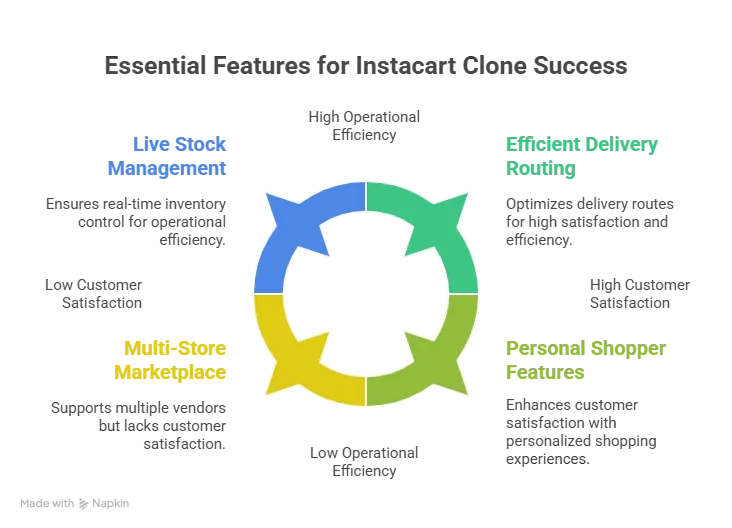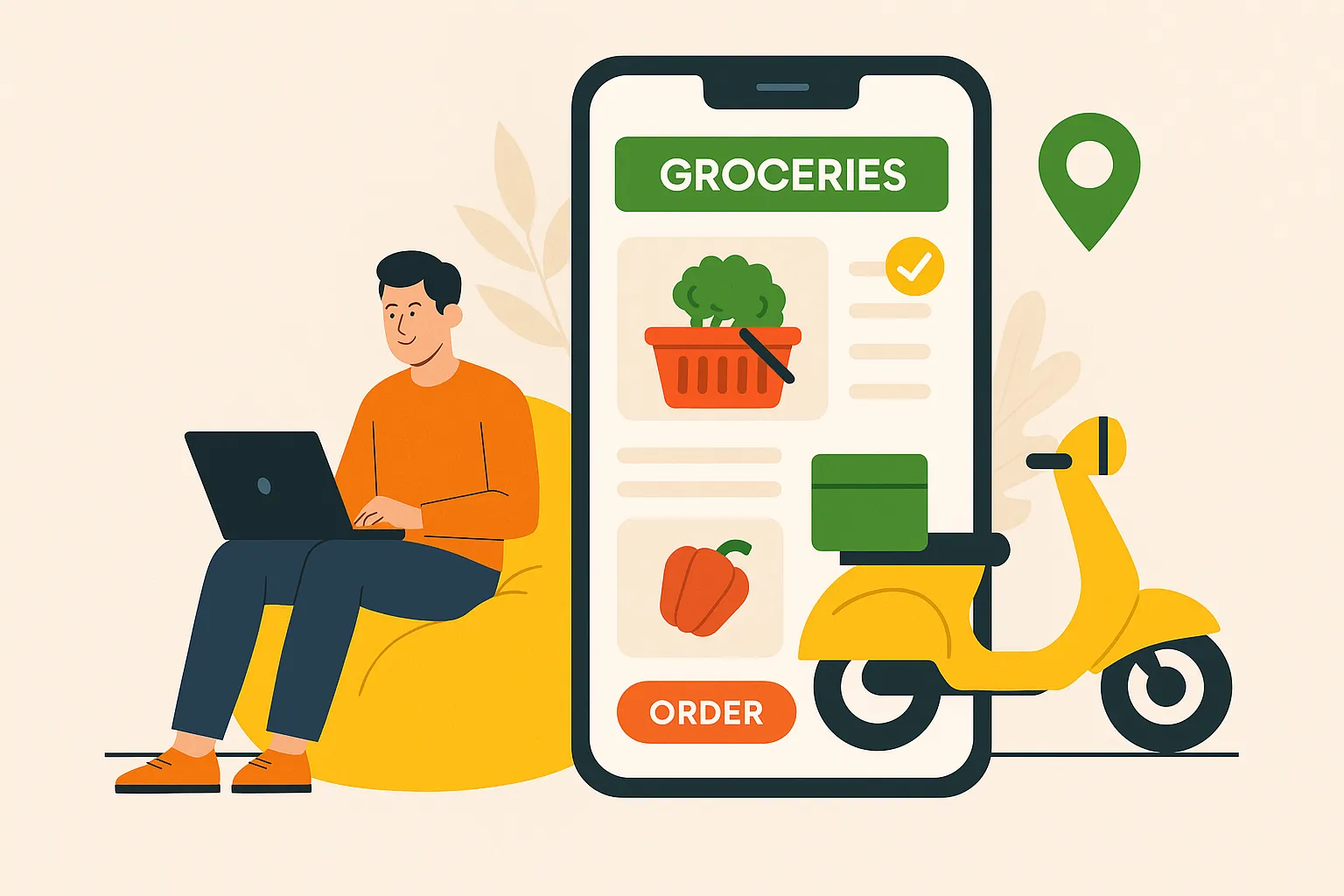There was a time when grocery shopping meant long queues, crumpled lists, and missed items. In 2025, it’s all about convenience, speed, and precision. People now expect their groceries to arrive at their doorsteps before they can even finish their morning coffee. Instacart clone scripts paved the way, but they’re not the endgame. They’re just the beginning
If you’ve ever thought about building your own grocery delivery app, a platform like Instacart is your shortcut to success. Whether you’re looking to serve a hyperlocal area, offer premium personal shopper services, or launch a category-specific marketplace—clone scripts let you skip the painful part of development and go straight to growth. The trick lies in picking the right one for your goals, customizing it smartly, and staying close to what your market really needs
At Miracuves, we’ve seen solo founders and grocery chains launch white-labeled delivery platforms faster than it takes to stock a warehouse. It’s not about reinventing the wheel—it’s about rolling it in your direction with precision and scalability
What Your Instacart Clone Must Absolutely Deliver
1. Multi-Store Marketplace
You’re not just building a grocery app—you’re building a network of stores. Your clone script should support multiple vendors, unique inventories, per-store pricing, and delivery rules. It should allow customers to shop from different stores in a single order or split orders seamlessly
2. Personal Shopper Features
One of Instacart’s biggest strengths is offering shoppers who handpick items in-store. Your clone script should include features like item substitutions, real-time shopper messaging, photo confirmations, and shopping progress updates. These features build trust and reduce refund issues
3. Live Stock Management
Your vendors need real-time control over what’s in stock and what’s not. Make sure your script supports dynamic inventory sync, item toggling, and category-based updates. Advanced scripts also support barcode scanning and in-store POS syncing
4. Smart Cart & Recommendations
Your app should help customers get what they need quickly. That means shopping lists, recently bought items, “frequently bought together” suggestions, and auto-fill based on preferences. Time is money—and groceries shouldn’t take either
5. Efficient Delivery Routing
Delivering groceries is more complex than delivering food. Routes matter. Your script should optimize delivery based on item type, perishability, traffic, and drop zones. Features like batch deliveries, route heatmaps, and cold-chain support add serious value
Read More : Launch Your Online Grocery Delivery Platform Like Instacart
Modern Features You Can’t Afford to Skip in 2025

- Scheduled Delivery Slots: Let users pick a delivery window that suits their day
- Repeat Orders: One-click cart rebuild for weekly shoppers
- Driver Role Flexibility: Allow stores to use their own staff or external fleets
- In-App Tipping: For personal shoppers or delivery partners
- Pickup Option: Give users the choice to shop online and collect in person
- Grocery Subscription Plans: Offer weekly/bi-weekly curated deliveries for loyal customers
- Order Weight Calculator: Helps drivers and stores manage capacity
Pricing Overview: What Will It Cost You?
Basic Scripts ($400 – $1,200)
Typically template-driven with single-store support, basic delivery, and inventory panels. Best for testing MVPs or operating in small towns. Scaling is tough without backend customization
Mid-Tier Scripts ($1,500 – $3,500)
Multi-store ready, with vendor portals, order tracking, admin dashboards, and mobile apps. Often built on Laravel or MERN. Suitable for serious regional launches with full white-labeling
Enterprise Platforms ($4,000 – $12,000)
These come feature-loaded with advanced routing, shopper features, real-time inventory sync, POS integration, driver heatmaps, and powerful analytics. Perfect for chains, city-wide launches, or startup founders planning for rapid growth
Always account for additional costs like cloud hosting, delivery APIs, third-party services like SMS/email, and app store fees.
Cost Factors & Pricing Breakdown
Instacart-Style Grocery Delivery Platform Development — Market Price
| Development Level | Inclusions | Estimated Market Price (USD) |
|---|---|---|
| 1. Basic Grocery Delivery MVP | User registration & login, address management, store listing, basic product catalog, cart & checkout, simple delivery slot selection, order history, basic promo codes, and a standard admin panel. | $40,000 |
| 2. Full-Feature Multi-Store Platform | Multi-store onboarding, real-time inventory sync (at catalog level), shopper/driver app, live order tracking, multiple payment gateways, coupons & offers, ratings & reviews, basic analytics & reports. | $90,000 |
| 3. Enterprise-Grade Delivery Ecosystem | High-concurrency architecture, advanced route planning & batching, shopper performance management, surge pricing, subscription & membership, marketing automation, loyalty engine, multi-region support. | $160,000+ |
The above pricing reflects typical global development cost for building an Instacart-style multi-store grocery delivery marketplace from scratch—covering customer apps, shopper/driver tools, merchant/store dashboards, and an enterprise-grade backend.
Miracuves Pricing for an Instacart-Like Platform
Miracuves Price: Starts at $2,899
Miracuves provides a ready-to-launch Instacart-style grocery delivery solution that includes customer app, shopper/driver app, store/merchant panel, and a powerful admin console at a fraction of global custom development cost. You still get a production-ready ecosystem that can be branded, extended, and scaled as order volumes and service areas grow.
Note: This includes full non-encrypted source code, complete deployment support, backend/API setup, admin panel configuration, and publishing assistance for Android & iOS applications—ensuring the platform is ready for launch and future expansion.
Launch your Instacart-style grocery delivery app faster while others spend tens of thousands of dollars and wait months—start with Miracuves and go live in days.
Delivery Timeline for an Instacart-Like Platform with Miracuves
Estimated deployment timeline: 3–6 days, depending on:
- Number of cities, zones, and grocery stores configured at launch
- Payment gateways, tax rules, and delivery-fee logic
- Level of branding, UI tweaks, and language/currency settings
- Any add-on modules (subscriptions, loyalty programs, advanced analytics, dark-store workflows, etc.)
Tech Stack
This solution is built with robust frameworks — Web using PHP, MySQL & Apps using Flutter, optimized for performance, stability, and easy maintenance.
Read More : Instacart vs UberEats Business Model Comparison
Who Should Launch an Instacart Clone?
1. Independent Grocery Chains: Compete with big players by offering personalized service and building brand loyalty through your own app—not someone else’s
2. Local Entrepreneurs: Own the delivery game in your city or district. By partnering with local stores and kirana owners, you can offer value that national apps can’t match
3. Organic & Specialty Stores: Launch a grocery app that only caters to organic produce, gourmet snacks, or keto supplies. Niche platforms can drive deeper engagement and better margins
4. Supermarket Brands: If you run or manage a retail chain, an Instacart clone lets you cut out commissions, control the delivery experience, and offer better deals to your customers
5. Aggregators & Community Builders: Apartment complexes, co-living communities, or student housing can benefit from hyper-targeted grocery delivery solutions. Group ordering, subscription deliveries, or preferred vendor tie-ups can make the model thrive
Read More : Top Features of Instacart App for Grocery Delivery Businesses: A Complete Guide
What Makes 2025 Instacart Clone Scripts Smarter?
- Inventory AI: Suggests reorder points for stores based on shopping patterns
- Fridge-to-App Scanning: Let customers scan barcodes at home to refill items
- Delivery Slot Intelligence: Optimizes available time slots based on zone activity
- Eco-Friendly Add-ons: Plastic-free delivery options and carbon impact badges
- Nutrition Tagging: Show macros, allergens, and dietary tags next to every product
- Multi-Language UX: Localize everything from item names to checkout flows for better regional adoption
- Weather-Integrated Routing: Adjust delivery time windows based on local forecasts
These are no longer “nice to haves”—they’re becoming the norm in competitive delivery markets
Final Thoughts
Instacart showed the world that grocery delivery wasn’t just a pandemic-era luxury—it’s a permanent habit. If you’re planning to launch your own grocery platform, an Instacart clone script is the smartest way to get to market faster, without compromising on customer experience or scalability. With the right mix of features and local insight, you can create something far more relevant than the big names ever could
At Miracuves, we help innovators launch high-performance app clones that are fast, scalable, and monetization-ready. Ready to turn your idea into reality? Let’s build together
Still have questions about Instacart Clone scripts? Let’s clear them up
Can I launch an Instacart clone in one city and expand later?
Yes. The best clone scripts come with zone management, allowing you to scale city by city with separate settings, delivery rules, and vendor onboarding
How do I manage multiple stores in the app?
Each vendor gets a login, product dashboard, and inventory control. You can control visibility, commission, and product availability per vendor from the admin panel
Do these scripts support cold-chain or perishable delivery?
Yes. Some advanced scripts include packaging instructions, storage type flags, and delivery partner alerts for time-sensitive items
Can I include a personal shopper feature?
Absolutely. Most high-end scripts support shopper dashboards with pick lists, customer notes, and live chat for real-time replacements
What payment methods are supported?
Top scripts support multiple gateways including Stripe, Razorpay, PayPal, cash on delivery, UPI, and in-app wallets
Can I run promotions or offer discounts?
Yes. Admins and vendors can launch coupons, loyalty points, referral codes, and seasonal campaigns right from the dashboard
Related Article








